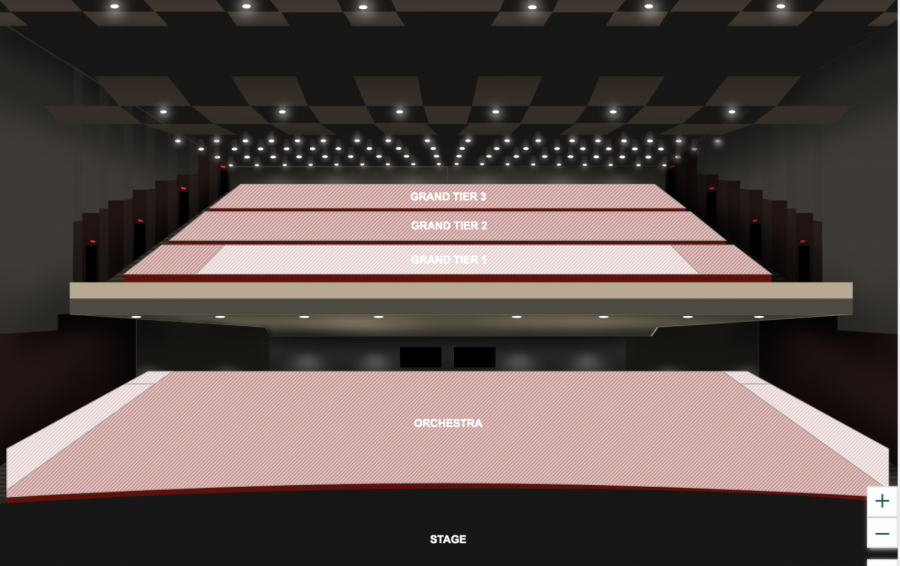iNite’s legacy: a shortage of tickets?
The image on the ticket selling website displays the lack of available iNite tickets. Tickets were up for sale on Monday, Jan. 19 at 4 pm but sold out quickly. People who failed to score tickets use the iNite tickets Facebook group to connect with sellers for a second chance at getting tickets.
February 3, 2020
Over 700 performers. 21 acts from different clubs and organizations. One show. iNite brings people together and some even consider it the largest event at Jefferson all year. Even so, many struggle to get tickets to iNite.
Every year, iNite is held at the George Mason Center for the Arts, in the 2000-seat concert hall. However, with he combined numbers of the parents of performers and other students, those 2000 seats do not satisfy the demand. Tickets went on sale on Monday, Jan. 19 at 4 pm and then sold out in minutes.
“I was trying to get tickets for iNite. But to my surprise, I found that they were already purchased. I was really looking forward to spending time with all my friends,” freshman Vamsi Merla said.
The demand is so high that a Facebook group is dedicated to people attempting to buy tickets for themselves or their parents. Over 60 posts were posted on this Facebook group on Monday Jan. 19 alone, by students and parents looking for tickets.
“I consistently saw that people would try to buy tickets, [the ones] who had not been able to buy them at four o’clock when they went on sale, and the first person who messages was able to get the tickets. Then a month later on the iNite tickets Facebook [group], still first come first serve,” senior Keegan Lanzilotta said.
For better or worse, Jefferson’s administration deemed scalping, or increasing ticket prices when selling them to others, against the honor code.
“People want more tickets than there are. The price is clearly too low because there’s too many people who want to buy the tickets at the price that they’re selling them for. But because they have this cracking down on scalping, there’s a huge shortage,” Lanzilotta said.
At 4 pm when the tickets go on sale, people still buy multiple tickets to sell later, sometimes in creative ways.
“So junior year, I decided I would buy as many tickets as I could. I ended up with 12 tickets. I wanted to offer an alternative way for people to be able to buy the tickets. They can’t pay me more. So I said, what am I going to do? I had a competition in Fortnite, had people paired up. We did a bracket and then those people who won the competition had the opportunity to buy the tickets from me, at the price I paid,” Lanzilotta said.
Scalping is prohibited and the demand is still much greater than the supply. iNite could be held at a different venue, but that option may not be possible.
“There are very few other places in the whole area that have anything bigger, it would literally have to be the Kennedy Center, or places far out like Baltimore. So GMU was the only place that is feasible for our group. Their facilities are very good. And not only that, George Mason itself is central to where TJ people live,” Latin teacher and iNite organizer Ms. Patricia Lister said.
Due to these constraints, in 2014 the organizers of iNite responded to the large demand by holding two separate shows.
“What would help would be if we could have two shows, which we did once, but it’s very hard to schedule. So the last few years, we have not been able to have more than one,” Lister said.
With only one show occurring each year, this can lead to increased competition for tickets – making scalping seem like a market solution.
“[It] lets the market do its work: you allow scalping to allow prices to rise to whatever the natural prices because clearly $10 a ticket or $15 per ticket is way too low. If there’s a healthy market that people can scalp on, then if you miss buying it, you don’t need to know someone who has tickets,” Lanzilotta said.
However, allowing the prices to adjust themselves based on how much students are willing to pay is disadvantageous to some students.
“It’s, in some ways, unfair because you have to pay more for it. And some people might not be able to afford that,” Lanizilotta said.
Another primary complaint is who specifically fails to get tickets: often seniors or parents of performers are left without tickets and must plead for a chance to see their last iNite through Facebook posts.
“The problem is that if everybody who’s performed got two tickets, we would run out. So we can’t make more seats, we cannot make more tickets. We hold back a block of tickets for seniors, because we feel like this is their last chance. So if they didn’t get tickets the regular way, we have a senior lottery. Then I have a small group of tickets that I hold back for performers whose families didn’t get any,” Lister said.
Despite all the hustle, many people managed to buy tickets through the Facebook group or the senior lottery. Others did not.
“Given that we have X number of tickets, we do [this] so everybody has a chance to get on at once. Everybody has access at the same time. And iNite brings a lot of joy to this school,” Lister said. “So we work really, really hard to try to make it as fair as possible.”






